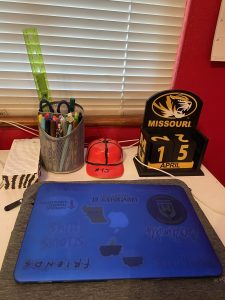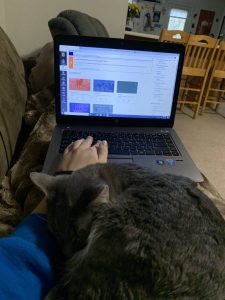In mid-March, the University of Missouri System announced that its four universities would conduct remote courses for the reminder of the spring 2020 semester due to the COVID-19 pandemic. Most students traveled home and have been finishing their coursework remotely.
Students in the College of Agriculture, Food and Natural Resources (CAFNR) don’t only receive a degree during their time in Columbia – they get the entire CAFNR experience. That experience includes access to award-winning advisors and teachers; research opportunities with internationally renowned scientists; study abroad options tailored to degree programs and in more than a dozen countries; career expos bringing nearly 200 employers to campus each year; hands-on learning experiences; and student-operated clubs and organizations.
The CAFNR Experience has changed drastically in light of the recent changes required due to the COVID-19 pandemic. Students are working hard to keep on track as the end of the semester is being completed remotely.

“We certainly understand how difficult this transition has been for our students,” said Bryan Garton, senior associate dean and director of academic programs. “We’re doing our absolute best to provide them with the best experience possible, but that looks very different this semester. We’re thankful for our student’s resiliency and understanding during this trying time.”
Teaching faculty within CAFNR have been working around the clock to make the transition to remote learning as easy as possible. Communication has been key throughout the entire process.
“The communication between professors and their students is crucial in the remote learning transition,” said Jayce Simoncic, a senior biochemistry major. “My professors have been very clear with the upcoming due dates for assignments and what is expected to happen over the course of the remaining semester. I have found all of my professors to be very accessible via Zoom when I have had questions. This is extremely helpful in times of change. Furthermore, my professors have been extremely understanding of the challenges that students may face.
“Also, I have noticed students to be very aware of the stress that professors may be having during this time. We are all in this together so it is important to be as understanding as possible.”
Faculty are utilizing various forms of electronic communication to keep students connected. Canvas, Zoom and Panopto have been incredibly important for CAFNR faculty during the transition. Still, the lack of face-to-face interactions has left many students feeling disconnected from MU – especially from their classmates and friends.
“I have definitely missed being on campus with friends in and out of classes,” said Audrey Hannah, a junior agribusiness management major. “To try to combat that missing interaction, I have FaceTimed a lot of friends and texted a lot of people from my classes. I still text my classmates just to talk through new concepts with them sometimes because I like their input. I have really missed the ‘normal’ Mizzou experience a lot during this time.
“I have definitely tried to keep the mindset of finishing strong. I keep reminding myself this is only temporary and it is a blessing to be able to still learn during this time.”
Hands-on learning experiences have been some of the most challenging aspects of the CAFNR Experience to transition to remote learning. Those experiences are vital for several students, especially those who are working with livestock or machinery.
“The initial change to remote learning was both a shock and a great disappointment to me,” said Haley Bauer, a senior animal sciences major. “I had multiple classes that involved hands-on labs that I believe to be greatly essential to my learning the subject. Primarily, I was very disappointed to not be able to continue on in my Horse Production and my Equine Reproduction courses. I had not previously had much contact with horses, and this was supposed to be my opportunity to familiarize myself with the care of horses and prepare myself for vet school. I was also greatly saddened to not be able to help foal out any more mares, especially since it felt like I was leaving the workers there short-handed.
“I have been greatly fortunate in that my professors have been very transparent when trying to figure this thing out along side us students. I am especially grateful to Instructor Marci Crosby, since she has tried to maintain a connection with us students through Zoom meetings and through camera feeds of our mares on the farm. She understands the desire for us students to get hands-on learning and tries her absolute best to maintain a quality learning environment for us students despite the current limitations.”
Study abroad opportunities have also been put on hold during the pandemic. Grace Miller, a junior agricultural education major, was a 2020 Bond International Scholars Award recipient and was studying at Lincoln University in Lincoln, New Zealand, during the spring semester. She arrived in New Zealand in mid-February but was forced to return to the United States in late March.

“Since I am still taking classes through my Lincoln University, I have to deal with a 17-hour time difference,” Miller said. “The University and instructors have been extremely considerate and understanding about my being out of the country trying to study. All of my professors assured me leniency was the virtue of the remainder of the semester. So, I’m just trying to stay on top of things and make sure I turn in assignments on time best I can. My situation is not too different from the other MU students taking MU courses.
“Like other CAFNR students, I’m sure, we are all just trying to do the best we can with what we have. I have a great faith in myself that I can still perform well as a student and citizen while the rest of state, nation and world realigns itself as best it can. Though I was brought back months early from my time abroad in New Zealand, I don’t take my situation personally. I feel a lot of CAFNR students feel as I do – we did not want this nor expect it. So, instead of mulling over the injustice of it all, we will shoulder our load for the time being and trudge on with the rest of the world; I guess that’s how we overcome challenges, with perseverance.”
The various clubs and organizations that CAFNR students are involved in are also working in a different manner. While group outings and activities aren’t possible, staying in touch has been vital for participants.
“I’ve told a lot of people this – I’m sick of looking at screens all day,” said Alexis Clemons, a senior environmental sciences major. “You never know what you appreciate until it’s gone, and I really miss face-to-face interactions with my peers. Luckily, a lot of my friends are in the Mizzou Meteorology Club, so we had a check-in meeting soon after we began remote learning. A lot of people joined, and we decided to continue ahead with our scheduled meetings and to have a few more meetings where we could just hang out and talk over Zoom. While it’s not the same as face-to-face, it’s better than not seeing them at all.”
Clemons is also a weekend morning weathercaster for KOMU 8 News. She has been able to continue this real-world work experience, with a few minor changes.
“We have to practice social distancing in the studio, and I have to watch what I say about the weather,” Clemons said. “For instance, I can’t say things like, ‘Today would be a great day to go to the park,’ or things like that. Instead, I say, ‘This weather is good for outdoor activity,’ or, ‘It may be a good day to turn on the air conditioner.’”
Graduate students are also dealing with a much different workflow as they continue their educational pursuits.
“I am fortunate enough to be at a point in my studies this semester that my core graduate-level classes, such as advanced food chemistry and microbiology, are complete, so the transition to online learning hasn’t hurt me nearly to the degree it has for others,” said Joseph Baratta, a graduate student in food and hospitality systems. “The things I am enrolled in, such as statistical methods for research, or graduate seminar, do not currently have labs associated with them, so the transition in terms of taking classes remotely was mostly a quick growing pain of figuring out video lectures and timing, and how to distribute and collect assignments.
“On the other hand, my work as a teaching assistant with this change has been much more tumultuous. In teaching ASM 2340, the pesticide and sprayer class with an extensive lab curriculum, we had a ton of extraordinarily cool content lined up with field trips, equipment demos and facility visits that all had to be redone virtually in whatever capacity possible. It is somewhat disheartening to know that instead of a field trip to see drones, the best alternative you can deliver to students is a YouTube video, a discussion and some interesting reading. We are making it work, and trying to present cool and engaging content, but it still doesn’t have the same feel to it.”
Mizzou recently postponed commencement and will host a virtual celebration of its graduates in May. While that postponement may not be shocking considering the circumstances, it is a thought the seniors are still adjusting to.
“As a senior, the biggest disappointment of not being on campus at the end of my collegiate career is not being able to see my classmates and friends,” Simoncic said. “It is difficult knowing that I may not see some of my good friends again in-person. So, it is very tough. The best thing we can do as seniors is to focus on all of the great experiences we have had over the past four years at Mizzou.”